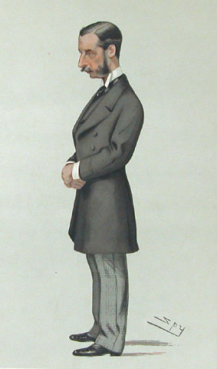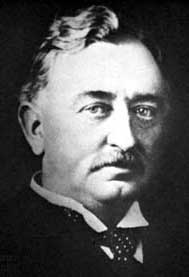This is the fifth installment of a series about Rhodesia.
Lobengula’s envoys and the two white men who accompanied them, Maund and Colenbrander, arrived in Southampton early March, 1889. Babayane and Mshete wore western-style hats and three-piece suits, not any colorful garb that Europeans might have expected from the headmen of the Matabele king. They were received immediately by the Queen at Windsor Castle, despite worries by the Colonial Secretary, Lord Knutsford, that a meeting would imply a promise to “undertake protection of Lo Bengula.” By chance, passengers with influential connections aboard the same steamer from Cape Town struck up an acquaintance with the four men en route and pulled strings to have them received. The envoys delivered the written message “signed for Lobengula” by Maund about the Portuguese claim on the Mazoe River that Maund wanted for himself, and they conveyed an oral message whose exact substance will never be known.
While at Windsor, the two indunas were shown the spear of the Zulu king Cetshwayo, which had been presented to the Queen by Major General Evelyn Wood after the conclusive defeat of the Zulus at Ulundi in 1879. Given the close relationship between the Zulus and the Matabele, one can only wonder what they thought about that. The envoys were also taken to see field exercises at Aldershot conducted by the same General Wood, in case the message of Britain’s military might needed reinforcement.
They met with Lord Knutsford three times, breakfasted with the Aborigines Protection Society, and saw many sights, including the London Zoo, the Bank of England, Westminster Abbey, and St. Paul’s Cathedral. Before they departed March 29, Knutsford gave the deputation a letter signed by him and “commanded by the Queen” that responded to the oral message conveyed by Babayane and Mshete. Couched in an amusing pseudo-African turn of phrase, it said, among other things, “The Queen wishes Lo Bengula to understand distinctly that the Englishmen who have gone out to Matabeleland to ask leave to dig for stones have not gone with the Queen’s authority, and that he should not believe any statements made by them to that effect… A King gives a stranger an ox, not his whole herd of cattle, otherwise what would other strangers arriving have to eat?”
This amounted to a rejection by Knutsford of mining or land claims by Rhodes and the Cawston-Gifford syndicate, now being amalgamated—even though Knutsford himself had earlier encouraged the parties to join forces. He’d actually been swayed by the visit of the two Matabele men and by the growing movement in England to support “native rights.” The Aborigines Protection Society wrote its own letter of advice to Lobengula that Knutsford passed on to the envoys together with the “herd and ox” letter.
Also puzzling and contradictory were the actions of Edward Maund. He’d started out the trip intending to use the two envoys to bolster objections to the Rhodes-backed Rudd concession, in favor of the interests of Cawston and Gifford, with whom he was affiliated. When in Cape Town he learned they planned to amalgamate with Rhodes, he continued onward to England with the envoys, his plans and motive unclear. It’s known he had communications in London with Rhodes, who had come to England to discuss the merger and promote his effort to obtain a royal charter. Did Maund warn Rhodes that Knutsford had shifted position? Did he tell Rhodes about the “herd and ox” letter and urge Knutsford to revise it, only to be rebuffed? Maund later publicized both of these versions, but at the time, Rhodes accused him of failing to warn him about the shifting sands of the Colonial Office.
But for someone like Rhodes, these petty obstacles could be overcome. Talks over amalgamation continued full speed, and Rhodes spent the next months meeting with influential people to enlist their support for a chartered company that would extend British business interests into the heart of Africa—under his control.
In the meantime, Lobengula wrote his letter repudiating the concession, as mentioned in our last installment. He’d heard enough from all parties concerned: Rudd’s associates, Rudd’s competitors, and the missionaries. The letter made its way very slowly toward London. No one helped him by arranging for a cable to be sent, allowing him to take advantage of that useful invention, the telegraph.
The amalgamation
Details of the amalgamation were much more complicated than an agreement between Rhodes, Cawston, and Gifford. First of all, Rhodes was not the sole owner of the Rudd concession: it belong both to him as an individual and to his gold mining concern, Consolidated Gold Fields. Rudd was also, appropriately, part-owner of the concession that bore his name, and Alfred Beits, Rhodes’ diamond-mining partner, had part ownership as well.
On the other side, Cawston and Gifford had formed an enterprise called the Exploring Company that had done considerable work to advance claims in two specific areas, the Mazoe River (which Maund had complained was encroached upon by the Portuguese) and the Shashi-Motloutsi area. It was eventually agreed the Exploring Co. would have half interest in those two areas and quarter interest in the Rudd concession.
These were the leading parties, the ones who had made big investments, obtained the most watertight concession documents, and had the best connections in England. But many other individuals had been working for concessions in recent years—these were part of that burgeoning white community in Bulawayo—and they had to be “squared” so that they didn’t pop out of the woodwork at some future point and cause trouble. Some had concession documents of their own, signed by Lobengula himself. One contender, a man named Leask, had made an agreeement with Lobengula for mining rights that gave 50% of the proceeds to the king himself. Rhodes had bought him out back in January. But others remained—some with claims in specific areas, such as the Austral Africa Co., represented by Alfred Haggard, brother of novelist Rider Haggard; some with concessions granted by rivals to Lobengula.
Eventually, all these competitors were taken care of. Rhodes would always be able to buy out anyone who might challenge his ambitions. The smaller men were “squared” informally with cash. The more influential, such as Austral Africa, gave shares in their companies in exchange for smaller numbers of shares in the new amalgamated company, which had the obscure name of Central Search. It turned out that Central Search was formed for a very specific purpose, which we will see in a later installment.
The royal charter
By this time Cecil Rhodes had become a major figure in southern Africa, but he wasn’t all that well known in England, and those who did know him often spoke of him disparagingly. For instance, a high-ranking man in the Colonial Office knew of him from his Oxford days as “grotesque, impulsive, schoolboyish, humorous and almost clownish.”*
But Rhodes, patient and determined, set about enlisting support among people of influence. The social prestige of his new associates Cawston and Gifford helped him to recruit the Tory Duke of Abercorn as chairman of the company Rhodes created to receive a charter—the British South Africa Co., not Central Search—and political balance was achieved when the Liberal Duke of Fife took the post of vice-chairman. A third leading member of the establishment, Albert Grey, also joined the board. He was nephew of the Cabinet minister Earl Grey and a leading voice for British imperialism in southern Africa.
These were joined on the board by the prime minister’s son, Lord Robert Cecil, and eventually by a friend of the Prince of Wales, Horace Farquhar. Gradually public opinion moved to support Rhodes’ company, and prominent figures in the press spoke highly of his “civilizing mission.” With the expansion of Britain’s benevolent empire, the British South Africa Co. could even help to combat Arab slavery north of the Zambezi. In fact, Rhodes spoke openly of his intention to incorporate the whole region between the Zambezi and King Leopold’s Congo. This was seen as a bold and progressive goal.
By June 1889, the fickle Lord Knutsford of the Colonial Office had swung back to supporting Rhodes—no more of this “herd and ox” talk.
It was just about then that Lobengula’s letter repudiating the Rudd concession at last arrived in London.
Next: The betrayal of Lobengula.
*The official was Edward Fairchild, quoted in Thomas Pakenham, The Scramble for Africa. New York: HarperCollins Publishers, 2003.






I read Haggard’s King Solomon’s Mines. Probably didn’t win any literary awards but it was a real page turner. There is a heart stopping human sacrifice scene that must have been inspired by the Annual Custom of Dahomey.
I have tried Haggard but find him difficult even though I’ve read a lot from the same period. The Victorians are close to my favorites among great literary works, but their “pop fiction” seems too turgid and heavy handed to me. By contrast, I can read John Buchan’s WWI era books with great enjoyment (Buchan plays an important role in my own book, ‘The Twelve Streams of LeConte”). The later writers seemed to have more humor or a lighter touch.
“This was seen as a bold and progressive goal.” It seems like half of Africa was grabbed under the cynical claim of fighting slavery. I do find the British West Africa Squadron impressive though. They committed a sixth of their fleet at enormous cost and thousands of lives. This in a region that had little economic potential before prophylactic use of quinine was understood.
I would like to read about that squadron. It sounds interesting.